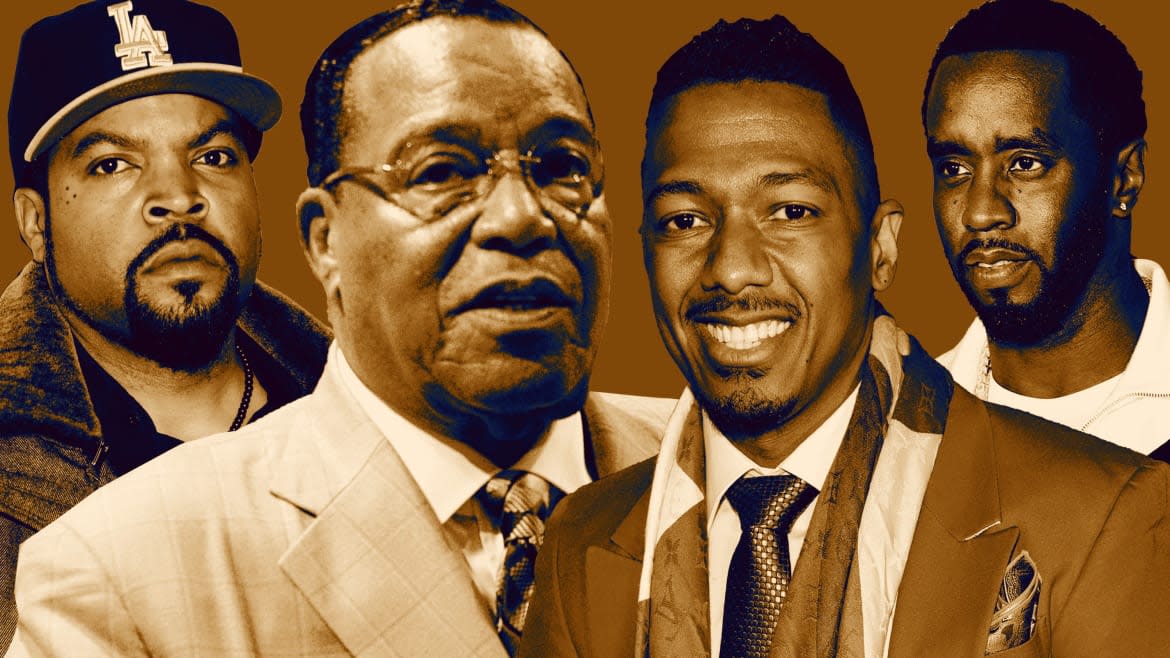The Disturbing Rise of Anti-Semitism Among Black Celebs

Often, we discuss conspiracy theories as if they are kooky yet benign tales spun by our neighbors, acquaintances, and even friends. But in America’s current political and cultural configuration, prejudice combined with ignorance often masquerades as legitimate thought and leads to devastating outcomes (just see how Floridian COVID-19 deniers are doing now). And in a society marked by incessant high-speed information and spin, anecdotal and instinctual bias becomes the basis of bad-faith arguments about free speech and a “marketplace of ideas.” As much as social media has brought us smart thinking by typically marginalized voices, it’s also allowed careless people with big platforms to speak more loudly—and without the immediate intervention of the wiser and better-informed people who may (or may not) surround them.
Recently, big-name Black entertainers like Ice Cube, Nick Cannon, Diddy, the Jacksons (Stephen and DeSean), and even beloved Black author Alice Walker, have spouted age-old anti-Semitic talking points—usually by quoting known bigot Louis Farrakhan—insisting that “the Jews” run everything, and locating Black liberation in anti-Jewish suspicion.
On his podcast, Cannon spoke to fellow anti-Semitic conspiracist Professor Griff, formerly of Public Enemy (he was kicked out of the group for his anti-Jewishness, specifically for calling Jews “wicked”), agreeing with Griff’s racist view that Jewish people control media and claiming that “Semitic people are Black people” so Black people cannot be anti-Semitic. After Cannon was dropped by ViacomCBS for his comments, Diddy then took to Instagram and invited Cannon to his network RevoltTV. On July 4th, Diddy’s RevoltTV broadcast a speech by Farrakhan—a man who has praised Hitler and repeatedly calls Jews “Satanic”—worldwide, and also shared a Farrakhan video on Twitter in which the Nation of Islam leader called the Jewish head of the Anti-Defamation League, Jonathan Greenblatt, “Satan” and claimed that “those of you that say you are the Jews, I will not even give you the honor of calling you a Jew. You are not a Jew. You are Satan, and it is my job now to pull the cover off of Satan so that every Muslim when he sees Satan, pick up a stone, as we do in Mecca.”
Ice Cube’s Long, Disturbing History of Anti-Semitism
Hollywood Celebs Are Praising an Anti-Semitic Hatemonger
The rapper and actor Ice Cube, for his part, has shared a series of anti-Semitic memes, and even lobbed an anti-Semitic trope at Kareem Abdul-Jabbar for denouncing anti-Semitism in a Hollywood Reporter op-ed, accusing him of accepting “30 pieces of silver” in exchange for the column.
It’s difficult to make sense of the smoke-and-mirrors anti-Semitism that emanates from Farrakhan, who feels he gets to decide who the real Jews are and then leverages any critique amongst Jewish-led institutions he doesn’t like on the basis of a Jewish identity he refuses to recognize. This is not too different from the “criminals” Trump claims are crossing the border from Mexico in droves—demonizing characterizations and willful erasure allow racist ideas to haphazardly take the form of concern. In the same way, Cannon denies that what he is saying is anti-Semitic because the only Semitic people he recognizes are Black people.
What’s more is that the crafted incoherence of these ideas make them easy to gloss over or outright ignore. Anti-Black and anti-Jewish racism are not interchangeable realities, but they are related and feed upon each other, undermining the liberation of Black and Jewish people (and, of course, Black Jewish people) alike. Like anti-Black racism, anti-Jewish racism cannot have a place in any legitimate anti-racist liberation movement, yet unfortunately, like with anti-Black racism, those who spout anti-Jewish ideas refuse to acknowledge their prejudice, instead qualifying their hateful words with claims to good intentions.
It’s easy to center the self, particularly when the self can serve as an avatar for an entire diaspora. But part of freedom work means imagining well outside of and beyond the self, persistently being in community with others committed to similar work. When Black celebrities claim that their anti-Semitism is actually a “pro-Black” stance, they assert that the only possible form of liberation for Black people is through creating our own “Other.” There is a huge difference between critiquing whiteness—a racist fabrication with undeniable social consequences—and denigrating Jewishness. Anti-Black racism (as well as anti-Arab racism) as practiced by Jewish institutions and individuals ought to be critiqued where observed, but on the basis of white assimilation and imperialism, not on the basis of Jewish identity. Scapegoating Jewish people—rather than challenging harmful institutions formed and led by people of any identity—plays directly by the facist rulebook.
But conspiracy theories often serve as a salve to incurious and unresilient people, even as the greatest conspiracy of all—racism—hides in plain sight. And it finds its way to even those of us directly harmed by its systemic manifestations. Like anti-Black and transphobic violence, anti-Semitic hate crimes have undeniably been on the rise since Trump’s inauguration. A viable counter to the bad and dangerous ideas that fuel this violence is deeper and more rigorous reading; rather than latching onto charismatic figures and cultural idols, we ought to get used to researching beyond YouTube videos, Google-able quotes, and Instagram reading lists. We need to engage less in forums filled with fearful people and step out into spaces of accountability and vulnerability. What would it mean to invest in a liberation movement that isn’t ego-driven or self-centering, but expansive and legion-gathering? How do we state our commitment to Black liberation without falling back on lazy and harmful thinking? Perhaps we still look to confused people like Ice Cube and Diddy because so many of us have refused to read, share, and discuss the vital work of critical thinkers like Angela Davis and Noel Ignatiev.
Get our top stories in your inbox every day. Sign up now!
Daily Beast Membership: Beast Inside goes deeper on the stories that matter to you. Learn more.

